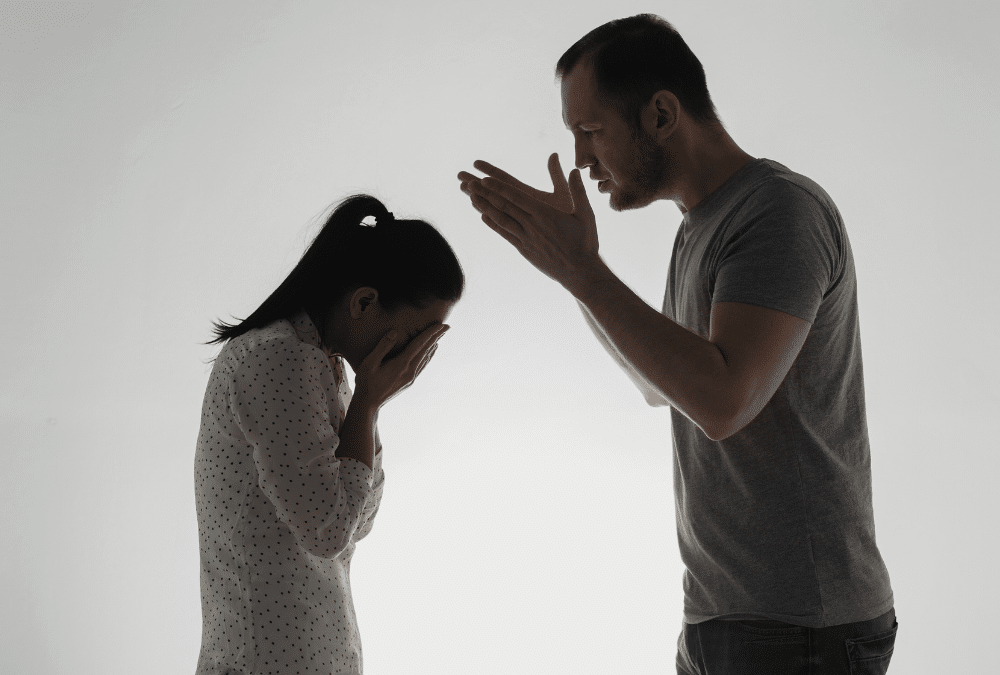“You have every right to feel as you do, but is it helpful?” Sharon Pope Science tells us that each of us has 60,000 - 80,000 thoughts per day. 80% of those thoughts are negative and 80% of those...


“You have every right to feel as you do, but is it helpful?” Sharon Pope Science tells us that each of us has 60,000 - 80,000 thoughts per day. 80% of those thoughts are negative and 80% of those...

“Caring about relationships, working on them, and upgrading our how-to skills have traditionally been women’s domain. When something goes wrong, we are usually the first to react, to feel pain, to...

“Those who have trouble giving attract those who have trouble receiving.” Amanda Owen My client - who I’ll refer to as Cheryl - had a baby five weeks pre-maturely and was suffering from postpartum...

“The simplest kind of decision is binary.” E.J.W. Barber I have seen this behavior thousands of times… “He’s a good man…”“He’s a good father…”“Everyone loves him…” When we’re struggling inside of...

“Trust is built with consistency.” Lincoln Chafee I have seen this behavior thousands of times… One partner in the relationship notices the disconnection and tries to make it better. They...

“Sometimes walking away has nothing to do with weakness, and everything to do with strength. We walk away not because we want others to realize our worth and value, but because we finally realize...

“The first secret to getting what you want is knowing what you want.” Arthur D. Hlavaty Years ago, I had a coach ask me: “Do you want it? Or do you just want to want it?” That one question floored...

“The words you speak become the house you live in.” Hafiz “There is nothing I wouldn’t do for my children.” “My kids are my highest priority; nothing is more important.” “I would walk in front of a...

“Boundaries mark the limits of behaviors that are acceptable to you, where words or actions beyond that limit cause you harm or make you feel unsafe.” Melissa Urban, The Book of Boundaries Many of...

“Give whatever you are doing and whoever you are with the gift of your attention.” Jim Rohn Derrick and I are sitting having a long, leisurely lunch at a cute...

“Instead of buying your children all the things you never had, you should teach them all the things you were never taught.” Bruce Lee Around this time every year, I see people quit on themselves in...

“Better to be hurt by the truth than comforted with a lie.” Khaled Hosseini Inside my program, The Decision, many of the women have had (or are currently having) an affair of some variety. They know...

“Courage doesn’t always roar. Sometimes courage is the little voice at the end of the day that says I’ll try again tomorrow.” Mary Anne Radmacher Julie and Chris used to be a great couple – laughing...

“A strong woman is one who feels deeply and loves fiercely.Her tears flow as abundantly as her laughter. A strong woman is both soft and powerful, she is both practical and spiritual. A strong woman...

“What comes easy won’t last long, and what lasts long won’t come easy.” Francis KongI never trust the couples who say they hardly ever fight are actually happy in their marriage. As a Relationship...

“There is a price to pay for speaking the truth. There is a bigger price for living a lie.” Cornel West It was around the tenth year in my first marriage that I began feeling very disconnected...

January is considered to be “Divorce Month” in the US, because it is the one month out of the year in which the most divorces are being filed. But there is one day in January that is the single day...

“Not everything that is faced can be changed; but nothing can be changed until it is faced.” James Baldwin Living near the ocean we hear a lot about rip currents, also known as rip tides and...

“Familiar discomfort feels the same as comfort.” Brianna Wiest Rebecca showed up on one of the Truth & Clarity calls my team member Rachelle hosts. She shared the deep challenges she’s...

“If you are not a hero of your own story, then you’re missing the whole point of your humanity.” Steve Maraboli “Your coach is just out there empowering women.” One of my clients shared this comment...

“What is rarely acknowledged and understood is that as these hormone-driven changes affect the brain, they give a woman a sharper eye for inequity and injustice, and a voice that insists on speaking...
The definition of self-esteem is confidence in one’s own worth or ability. The definition of intimacy is not – contrary to popular opinion - sexual intercourse. Sometimes intimacy gets expressed...

“One of the quickest ways to become exhausted is by suppressing your feelings.” Bill Vaughan “I am so tired. I am tired of just existing. I am tired of feeling like I’m not a priority. I am tired of...

“Unexpressed emotions never die. They are buried alive and will come forth later in uglier ways.” - Sigmund Freud “I haven’t felt connected to my husband for almost two years and I feel like I’m...

"Indeed there has never been any explanation of the ebb and flow in our veins - of happiness and unhappiness.” - Virginia Woolf No one finds their way to my work when they’re happy – at least not...

“Guilt is there to punish and protect us.” - Mastin Kipp One of the emotions that will keep women struggling in disconnected marriages stuck in indecision about whether to stay or go is guilt. Guilt...

“This phenomenon of decreasing desire as the relationship continues on is near universal for women…and men as well.” Dr. Lori Brotto Every time my husband and I want to go out to dinner, he asks me...

“If our thoughts aren’t in alignment with Queen energy, we need to change them.” Tonya Leigh There are some very ironic truths that I see in marriages today: Everyone on the planet wants to be heard...

You CAN have the relationship you desire.You CAN create the relationship of your dreams!It’s possible for you… just like it was possible for me. Give me five minutes to explain how! Because I hear...

Most of us get married because it’s something that we want within the life we’re creating. Which means, it’s somewhat like a milestone goal. And what happens when you “accomplish” the goal? You move...

Most coaches write books to establish credibility in their industry and preach their message to a wider platform. But I’ve written eight books (and counting)... I didn’t write this book for...

“If something is important to you, you will find a way. If not, you’ll find an excuse.” Ryan Blair I want to trust my husband again, BUT…I just don’t know if I can. I want to be able to open...

“A comfort zone is a beautiful place, but nothing ever grows there.” John Assaraf If you’ve been struggling in your marriage for a long time, there’s a reason why. If you’ve been following my...

WHAT I FEAR MOSTis the half-dead life. The neither this nor that life. The in-between,down the crack life. The one I can’t decidewhether I shouldor shouldn’t life. Because a limbo lifeis a half-dead...

“I know it’s a hard lesson to learn, but you cannot love yourself and love someone who hurts you at the same time. Please choose you.” Stephanie Bennett-Henry My client’s husband is controlling. She...
“Never apologize for asking for what you need, if you don’t ask - the answer will always be no.” Ken Petti Everyone has needs. And pretending otherwise is a lie. Women often have a difficult...
“Refusing to ask for help when you need it is refusing someone the chance to be helpful.” Ric Ocasek When our lives become stressful, do you think we should communicate more or less inside our...

“Whether you’re checked in or checked out, you’re always on a spiritual journey.” Alanis Morissette Women will often leave a marriage mentally years before they leave physically. When I’m working...

“Surveillance rarely breeds trust.” Esther Perel Joannie found out about her husband’s affair with a co-worker six weeks ago, and ever since, it’s been an emotional roller-coaster. He’s saying all...
“How does the pressing reality of the ‘I’ve gotta have him every minute of the day’ feeling in the brain transmute to an ‘Oh, hi, you again...How’s everything?’ state of mind? The hormone rushes of...
“Most women feel they can not renegotiate the unwritten marriage contract.” Louann Brizandine, M.D. It really is only within our long-term relationships where we are challenged to navigate the...
“When you share the details of your daily life, you create connection between two people. When you withhold details from your daily life from your spouse, you create disconnection.” - Sharon Pope We...

“The best time to do something significant is between yesterday and tomorrow.” Zig Ziglar I once had a client who was hard on herself for staying longer than she should have in her marriage. The...
“It’s not stress that kills us, it is our reaction to it.” Hans Selye For over a year, we’ve all been forced into very close proximity with our spouses. And only those in our immediate family or...
“Again and again he cheated on her. Every time she forgives thinking he would do it not again.” Jaspal Virdi When there’s been infidelity inside of a marriage, a lot of people might assume that most...

“Sometimes you just have to be done. Not mad, not upset. Just done.” Unknown My client’s husband had cheated, but she was trying to work through that… Her husband was drinking a lot, but she wanted...
“Beware of the people who make you think you’re holding a grudge when you’re really holding a boundary.” Mel Robbins Setting healthy boundaries isn’t something that we learned how to do. Certainly...
“I used to think the worst thing in life was to end up all alone, it’s not. The worst thing in life is to end up with people that make you feel all alone.” 2009 film, 'World’s Greatest Dad' One of...
“Desire is possibility seeking expression.” Ralph Waldo Emerson A couple of weeks ago, I talked about getting clear about your desires. This is so important. Because, as women, we were never really...
“People aren’t attached to people, they’re attached to their beliefs.” Byron Katie My client, K., had been married for nearly 20 years and she had two boys, ages 15 and 9. The marriage hadn’t been...
“But when we reduce the conversation to passing judgment, we are left with no conversation at all.” Esther Perel It’s not uncommon that my clients have had an affair at some point. I appreciate...
“After age seven, 95% of our life is based on the programs we downloaded in the first seven years. 70% of those programs are limiting and disempowering.” Bruce H. Lipton, Ph.D We all have wounds...
“Just because it’s not happening right now doesn’t mean it never will.” Daniell Koepke Have you ever wondered why some of the clients I speak about are able to make a decision about their lonely and...
“As I am is how this is.” Client L. I attract the most amazing women and this particular client was no exception. It wasn’t about her accomplishments, although she had those. It wasn’t about her...
“Nothing happens until the pain of remaining the same outweighs the pain of change.” Arthur Burt My client and her husband are both entrepreneurs. But my client was always frustrated because her...
“The stupid neither forgive nor forget; the naive forgive and forget; the wise forgive but do not forget.” -Thomas Szasz I have a client whose husband cheated on her...repeatedly. Every time life...
“The secret of change is to focus all your energy not on fighting the old but on building the new.” Socrates My client L. and I have been working together for nine weeks and even though she had been...
“The most important choice you make is what you choose to make important.” Michael Neill I saw something recently that kind of pissed me off. It said something along the lines of…. You have the bank...
“Daring to set boundaries is about having the courage to love ourselves even when we risk disappointing others.” Brené Brown One of the pervasive thoughts that keep women stuck in indecision is that...
“We only control what we don’t trust...Love is the opposite of control. Love demands trust.” Glennon Doyle One of my most favorite things as a coach is going back to review the words that were...
“Sometimes life is going to hit you in the head with a brick.” Steve Jobs What would happen if you stopped showing up for work? Seriously, pretend that starting tomorrow you’re just not going to...
“His strength doesn’t rob me of my own.” Sharon Pope As a young girl, I saw my mom work hard. Going from a part-time secretary when I was six years old to becoming a VP of HR by the time I was in...
“Conflict is the beginning of consciousness.” – M. Esther Harding In our closest, most intimate relationship...let’s be honest...we have some high expectations. We want to have a partner that can...
“But when you are attracted to someone it’s because of the details...their kindness...their eyes...their smile...the fact that they can get you to laugh when you need it most.” Unknown Author Some...
“In any moment of decision, the best thing you can do is the right thing. The worst thing you can do is nothing.” Theodore Roosevelt Each year, we make commitments to ourselves… We will eat...
“Practice the pause. When in doubt, pause. When angry, pause. When you’re stressed or frustrated, pause.” -Toby Mac My client did an extraordinary thing a couple of weeks ago. I referred to it as...
“We have to do our part and show-up for ourselves in order to gain our own self-respect.” -Jacqueline Somerville I heard something this week from one of my mentors that I had not heard before. She...
“Don’t wait for the perfect moment, take the moment and make it perfect.” Zoey Sayward For sure our holidays look and feel very different this year than in years past. We’re not traveling like we...
“It is not impermanence that makes us suffer. What makes us suffer is wanting things to be permanent when they are not.” - Nhat Hanh Women often find their way to my work when the problems inside...
“God’s purpose for man is to acquire a seeing eye and an understanding heart.” - Rumi If we want to have amazing relationships with men, we need to understand men a little better. (And yes, if men...
"No one is angrier than someone doing the “right thing” and secretly wishing for something else." - James Hollis Jill and Barry are going to cross their 16th wedding anniversary soon. But she...
If one has not in fact grown in the course of a marriage, it has been a dreadful disaster. Mere longevity in a marriage is not necessarily something to celebrate, for what happened to the souls of...
“Only one thing is more frightening than speaking your truth, and that is not speaking.” - Naomi Wolf One of my clients came downstairs and picked a fight with her husband about how messy the...
“I went to war for what we had; you never even laced your boots.” N.R. Shepherd When do you know the marriage is over? When do you stop fighting for the marriage? My client listed all the things...
“Just when you think you haven’t got anything left, take a deep breath and take one more step. It could be the one thing that changes everything.” - Rachael Bermingham Sometimes my clients surprise...
“If you’re only talking tactics and logistics (no longer talking about your hopes and dreams), your relationship will eventually feel like roommates.” -paraphrased from Alex Charfen When I ask women...
“A man is only insecure about a female when he knows she deserves better.” -Unknown Author Some husbands are grateful for the work I do with their wives. When their relationship completely...
“Your children will become who you are; so be who you want them to be.” -David Bly My new client and I met for the first time on our first video coaching session. It is during this first session...
A few days ago, I posted a quote from Frida Kahlo (a world-renowned self-portrait painter, with multiple disabilities in the early 1900s and a role model for generations of artists) to her husband...

“neither of us is happy but neither of us wants to leave so we keep breaking one another and calling it love.” -Rupi Kaur, Milk and Honey One of my clients recently shared with me an analogy of how...

“You’ll never find peace of mind until you listen to your heart.” George Michael If there is one relationship dynamic that I have seen hundreds (maybe thousands) of times it’s that once a woman...
“I will not stay, not ever again - in a room or conversation or relationship or institution that requires me to abandon myself.” Glennon Doyle ***You know how some videos come with a warning about...
“Oh, you weak, beautiful people who give up with such grace. What you need is someone to take hold of you - gently, with love, and hand your life back to you.” Tennessee Williams There was a time...
“The vow, ‘till death do us part, is killing our marriages.” Sharon Pope I know...I know….it’s blasphemy. Divorce talk from a relationship coach? (Insert gasp here…) But wait, there’s more...
“In relationships between dominant and subordinate groups, the subordinate group members always possess a far greater understanding of dominant group members and their culture than vice versa.”...
“When we avoid difficult conversations, we trade short-term discomfort for long-term dysfunction.” Peter Bromberg Maybe you’ve been avoiding having a difficult conversation with your spouse. Maybe...

“Difficult roads lead to beautiful destinations.” Zig Ziglar I have been working with R. for some time and she and her husband’s relationship have gone through plenty of high and low points. But...
"The first duty of love is to listen." Paul Tillich When we intellectually know something is both necessary and important… But we still choose to not pay much attention to it… That means...
It was about this time last year that my client, Suzanne, was waiting for her daughter to graduate before confronting her husband about his affair. She didn’t want that drama impacting her...
Why is marriage so hard? Does it have to be this difficult? Shouldn't it be easier? The answer is yes, but it will require us to begin accepting and embracing our differences rather than railing...
Why is marriage so hard? Why do my needs never get met? Will things ever change? I’ve been learning everything I possibly can about the differences between men and women so that we can begin to...
Have you ever asked yourself, why is marriage so hard? Implied in that question is that marriage shouldn't be difficult...that love should be easy, effortless. Clearly, that's not true. But marriage...
“Life has many ways of testing a person’s will, either by having nothing happen at all or by having everything happen all at once.” Paulo Coelho A worldwide pandemic… A child in struggle… An affair...
“When you show deep empathy towards others, their defensive energy goes down, and positive energy replaces it. That’s when you can get more creative in solving problems.” Stephen Covey If...
“You have to stop thinking that you’ll be stuck in your current situation forever…Don’t confuse a season, for a lifetime.” Brittney Moses I’ve heard several reports recently referencing how the call...
It’s only been a week since many of us were forced to start spending more time at home with our spouses. We went from spending a majority of our time at the office, the gym, running errands, and...
“You’ll never get what you need by demanding what you want.” Matthew L. Jacobson Has anyone come to you within the last week and asked you, “What do you need?” or “What can I do for you?” If...
“What you focus on expands. So focus on what you want, not what you do not want.” Esther Jno-Charles If you have been struggling in your marriage feeling disconnected and alone, I have some bad...

“It’s one thing to lose people you love. It is another to lose yourself. That is a greater loss.” Donna Goddard My client, who I’ll refer to as Sue, had been enduring more than her fair share of...
“There comes a point in every man’s life when he has to say: “Enough is enough.” Lance Armstrong I’m sitting on my hotel balcony on the second floor. It was a warm Arizona evening and there was a...